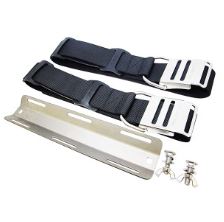24th Oct 2023
Exploring the Depths: A Comprehensive Guide to Scuba Gear Maintenance
Scuba diving is an exhilarating adventure that allows you to explore the mesmerizing world beneath the waves. However, to ensure a safe and enjoyable experience, it's imperative to keep your scuba gear in top-notch condition.
In this guide, we'll delve into the crucial aspects of scuba gear maintenance and answer the burning question: How often should you have your scuba gear serviced?
Importance of Regular Scuba Gear Maintenance
1. Ensuring Safety Underwater
Your scuba gear is your lifeline beneath the surface. Regular servicing ensures that all components, from regulators to tanks, function flawlessly, reducing the risk of malfunctions during your dive.
2. Prolonging Equipment Lifespan
Just like any mechanical equipment, scuba gear requires proper care to extend its lifespan. Routine servicing prevents wear and tear, ultimately saving you money in the long run.
3. Preventing Costly Repairs
Neglecting maintenance can lead to minor issues escalating into major, costly repairs. Regular check-ups and servicing nip potential problems in the bud.

Signs Your Scuba Gear Needs Servicing
1. Rust or Corrosion
Visible signs of rust or corrosion are red flags indicating the need for immediate attention. These issues can compromise the integrity of your equipment.
2. Difficulty in Breathing
If you experience any difficulty breathing while using your regulator, it's a clear sign that it requires servicing. This is a non-negotiable aspect of diver safety.
3. Leaks or Tears
Inspect your wetsuit, dry suit, and BCD for any leaks or tears before each dive. Addressing these issues promptly can prevent further damage.
Recommended Frequency of Servicing
1. Regulators and Octopuses
These critical components should undergo professional servicing annually or after every 100 dives, whichever comes first.
2. BCDs (Buoyancy Control Devices)
An annual check-up is crucial to ensure proper functioning. Additionally, perform routine checks for leaks and inflator issues.
3. Wetsuits and Drysuits
Rinse thoroughly after each dive and conduct a thorough inspection. Professional servicing should be done every 100 dives or at least once a year.
4. Tanks and Valves
Professional inspections are recommended annually or after every 50 dives.

DIY Maintenance vs. Professional Servicing
While basic cleaning and maintenance can be performed by divers, professional servicing offers a comprehensive check-up that ensures no detail is overlooked. It's advisable to combine both approaches for optimal results.
How to Clean and Store Scuba Gear
Cleaning Procedures
Rinse equipment thoroughly with fresh water after each dive. Use a mild detergent to remove salt and debris. Allow gear to air dry in a shaded, well-ventilated area.
Proper Storage Techniques
Store gear in a cool, dry place away from direct sunlight. Hang wetsuits and drysuits on wide, padded hangers to maintain their shape.
Selecting a Professional Service Provider
Choose a reputable service center with experienced technicians and a track record of quality work. Seek recommendations from fellow divers or your local diving community.
Cost Considerations
While servicing costs may vary, view it as an investment in your safety and the longevity of your equipment. Remember, preventative maintenance is more cost-effective than major repairs.
Common Myths About Scuba Gear Maintenance
"I don't use it often, so it doesn't need servicing."
Even infrequently used gear can deteriorate over time. Regular checks are essential to catch any issues early.
"I can service it myself; it's not that complicated."
While basic maintenance is encouraged, professional servicing provides a thorough examination that ensures all components are in prime condition.
"I'll just replace it if it breaks."
Preventative maintenance not only saves you money but also guarantees your gear's reliability when you need it most.

Frequently Asked Questions (FAQs)
How much does scuba gear servicing typically cost?
Costs can vary, but a standard check-up may range from $50 to $150, depending on the extent of the service required.
Can I clean my scuba gear with regular household cleaning products?
It's best to use mild, non-abrasive detergents specifically designed for scuba accessories and gear to avoid damaging sensitive materials.
Is it possible to over-service scuba equipment?
While regular maintenance is crucial, excessive servicing can lead to unnecessary wear. Follow manufacturer recommendations.
What should I do if I notice a minor issue with my gear?
Address it promptly. Small issues can escalate if left unattended, potentially leading to more extensive repairs.
Can I service my scuba gear at any dive shop?
It's recommended to choose a dive shop with certified technicians experienced in scuba gear maintenance.
The Roundup
Regular servicing of your scuba equipment and accessories is paramount for both safety and enjoyment during your underwater adventures. By following the recommended guidelines and being attentive to signs of wear, you'll ensure your equipment serves you well for years to come. Don't compromise on safety - schedule your next scuba gear servicing today.
